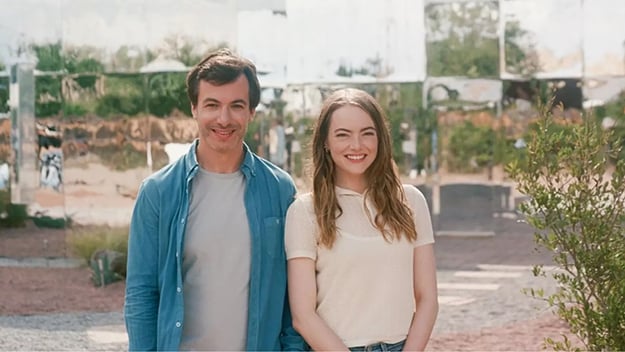Neighborhood Watch
This article appeared in the November 30, 2023 edition of The Film Comment Letter, our free weekly newsletter featuring original film criticism and writing. Sign up for the Letter here.

The Curse (co-created by Nathan Fielder and Benny Safdie, 2023)
“He has somehow melded Jacques Tati and Mark Cuban,” wrote Benny Safdie of Nathan Fielder in Cinema Scope in 2016, perceptively drawing a bead on the Canadian business-school grad–turned–culture jammer’s well-practiced yet uncanny mixture of megalomania and grace. More specifically, Safdie was praising the 22-minute masterpiece “Smokers Allowed”—for many, the apotheosis of Fielder’s acclaimed Comedy Central series Nathan for You (2013-2017). In that episode, the host’s (ostensibly) earnest attempt to revitalize a dingy L.A. dive bar by loopholing anti-smoking regulations mutates, at first slowly and then with the serene velocity that is Fielder’s stock-in-trade, into an exercise in avant-garde theater production. The whole thing somehow gets within spitting distance of Brecht, Buñuel, and Borges—and, while we’re at it, Invasion of the Body Snatchers (1978), specifically the terror of coming face-to-face with your own private pod person.
Ultimately, comparisons—and words—fail in the face of “Smokers Allowed,” which qualifies as the kind of dissociative, fugue-state tour de force that has been chased by vanguard artists across multiple mediums. In the episode’s most mesmerizing moment, an actress hired to play a bar patron ends up being (accidentally?) hypnotized during a “trust exercise” that doubles as an interrogation of the line between imagination and belief, and then of meaning itself. Repeating “I love you” ad infinitum, the young woman becomes an avatar of deconstructivism, with Nathan as the Empty Man. Whether you found it disconcerting or simply funny, “Smokers Allowed” was something remarkable. For Safdie, whose shorts and features with his brother Josh likewise have fused conceptualism with spontaneity and improvisation—all under the seductive, ever-fritzing neon sign of “reality”—Fielder’s perfectly executed Surreality-television experiment positioned him potentially as a rival, an inspiration, or maybe a kindred spirit.
Cut to 2023: Fielder and Safdie are the conjoined creative forces behind the formidable new Showtime series The Curse, acting as co-creators, co-writers (with Carrie Kemper), and co-stars (Fielder also directed seven of the 10 episodes). Set in and around the Santa Fe exurb of Española, whose economy is strictly big-box retail and whose local politics are consumed by debates over high crime rates and Indigenous land rights, The Curse meticulously documents the efforts of two smiling city-mouse gentrifiers—Asher (Fielder) and Whitney Siegel (Emma Stone)—to, well, meticulously document their efforts. The proposed showcase for the duo’s do-gooderism is an HGTV vanity production called Flipanthropy, which is being spliced together sullenly by troubled freelance filmmaker Dougie Schecter (Safdie). Like Nathan for You and Fielder’s subsequent HBO hit The Rehearsal (2022-), the structural principle is the labyrinth, or maybe hall of mirrors; there is a preponderance of reflective surfaces on display, including the glassy exteriors of the Siegels’ eco-friendly “passive homes,” which serve as unconsciously self-mocking monuments to their creators’ garbled utopian rhetoric (as well as rip-offs of real-life sculptor Doug Aitken). The mise en scène is mise en abyme; the cinematography by Maceo Bishop (surely the only person to have worked with Bong Joon Ho, Woody Allen, and Lin-Manuel Miranda) subdivides the screen into competing frames of surveillance, infusing the bland, jagged tactility of reality TV with sinister, whispery metaphysics. At the beginning of every episode, the show’s title card is seen warping the image behind and around itself like a vortex, a worthy emblem for what might be termed a comedy of distortion.
“Reality,” Fielder reminded us back in “Smokers Allowed,” “is what you make of it.” The Curse thoroughly examines this idea not only in terms of television production—Fielder’s endlessly fertile pet subject—but also with a more free-floating sense of cosmic ambiguity. Take the title, which directly refers to the hex a local child claims to place on Asher after he gifts her—and then takes back—a significant amount of money in order to look generous for Dougie’s camera. The title also dovetails with the ambient paranoia—and hilariously overcompensatory guilt—the Siegels feel as white (and Jewish) outsiders currying favor with their Latino and Native American neighbors. In particular, Whitney’s friendship with Cara (Nizhonniya Luxi Austin), a local artist whose work is conspicuously featured on the show-within-the-show, evinces a mix of predation and self-abasement, as if Whitney were a vampire feeding off her own bleeding heart. (If some enterprising writer were to try to seriously tease out thematic parallels between Fielder and Safdie’s portrait of solidarity-as-exploitation and the critique of same embedded in Martin Scorsese’s Killers of the Flower Moon, it’d be more than a hot take.)
Setting up the Siegels—whose solution to every problem is to throw Whitney’s hippie slumlord parents’ cash at it—as avatars of disingenuous, virtue-signaling cluelessness may seem like little more than batting practice, especially for satirists who like taking big swings. But that initial reading belies the finer shadings of The Curse’s project, which is to map the overlap between well-meaning generosity and unconscious solipsism. This nuance is made possible through the efforts of the actors, especially Stone, whose work here belongs in the contemporary pantheon of seriocomic acting. As much as Whitney may seem like a familiar type—the preternaturally poised Instagram addict curating herself to within an inch of her life—the actress finds a way in key scenes to somehow give three performances at once. Examining some cell-phone footage of her and Asher’s painstakingly re-created marital horseplay—shades, clearly, of The Rehearsal—she allows the show’s clinical scheme to function on all levels: she’s simultaneously the central specimen, the scientist looking (inward) through the microscope, and the fine-grained lens itself.
Stone’s neo-screwball virtuosity, with its perfectly timed movements and gestures, easily trumps Fielder’s feeble, awkward nonacting—or it seems to, until we realize that the disparity has more to do with the characters than the performers, and that Fielder is actually fully engaged in a role that inverts his usual relationship to the camera and the audience. On Nathan for You and The Rehearsal, the humor—and pathos—stemmed from the tension between control and chaos being channeled through the endearing but ontologically unstable figure of “Nathan Fielder.” In The Curse, Asher, who has no ability to mask his feelings, is at the sadistic mercy of Flipanthropy’s crew, which really means he’s at the mercy of Dougie, a kamikaze self-saboteur whose palpable animus towards his childhood pal ends up hijacking the entire shoot.
The question of whether Dougie knows what he’s doing—if he’s cultivating dysfunction for artistic reasons, or personal ones, or just for the hell of it—is one of several mysteries The Curse sustains at length, and without much promise of definitive resolution. To Safdie’s own equation of Tati and Cuban, we should now probably add David Lynch, and maybe also Fielder’s countryman David Cronenberg, whose eXistenZ-ial meditations on simulation and liberation inflect the show’s legitimately jaw-dropping finale (as of this writing, still several weeks away on the broadcast schedule). Near the close of Cronenberg’s prescient 1999 cautionary tale, a character asks: “Tell me the truth: are we still in the game?” The end of The Curse suggests that playtime is never really over.
Adam Nayman is a teacher and author based in Toronto, as well as a contributing editor to Cinema Scope and a critic for The Ringer.







